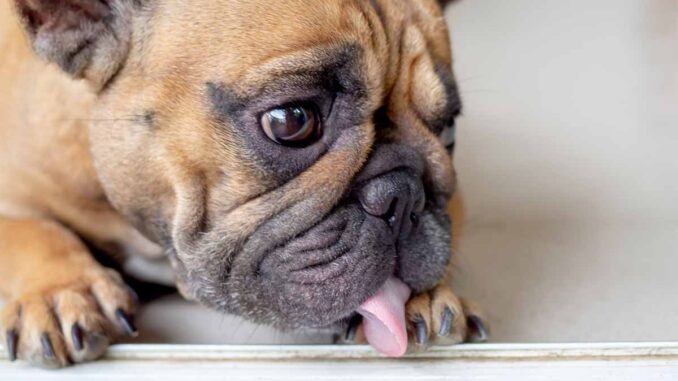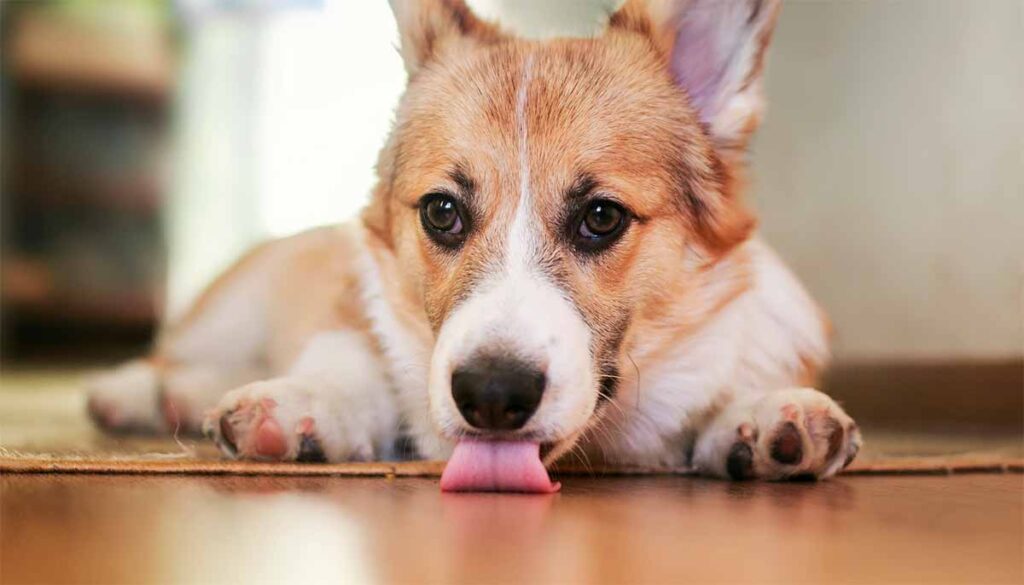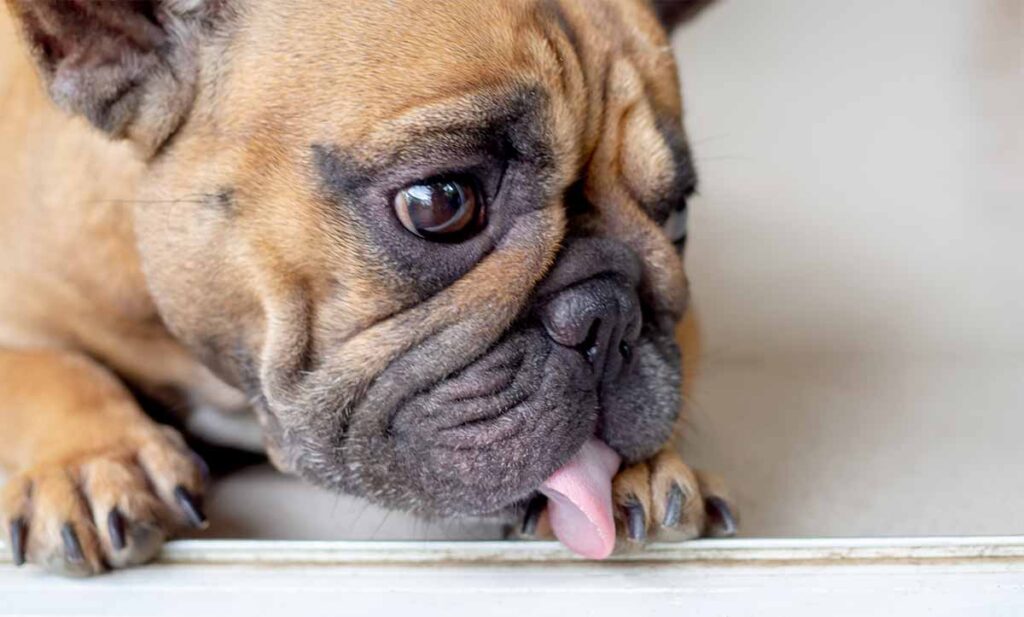
This article was updated on May 1st, 2023

As dogs grow older, they sometimes start engaging in a behavior that leaves their owners scratching their heads: licking everything from the carpet to the furniture. You find yourself wondering, “Why is my dog licking everything all of a sudden?” and then worrying that something might be wrong with your canine companion.
So why is your old dog licking the carpet and everything else they might find?

Frequent licking of carpet and other household surfaces or furniture is known as Excessive Licking Syndrome. This excessive licking has many causes and can result in gastrointestinal problems like chronic pancreatitis, giardiasis, and delayed gastric emptying.
So while both medical and behavioral problems can lead to senior dogs licking carpets or furniture, it isn’t something to worry about when done just once or twice. But when the behavior is repeated, you need to consider deeper medical issues. Some common causes of excessive licking in old dogs include:
Nausea
Dogs instinctively seek out grass when nauseous and might consider your carpet as an alternative. Have you ever seen your dog licking your carpet and coughing, gulping, or panting? If yes, then their nausea could be due to acid reflux. Nauseous dogs also smack their lips, drool, and swallow repeatedly. This is one of the most common reasons for a dog licking the carpet.
Dogs have an urge to lick when nauseous to induce vomiting, and your old dog may also be licking the carpet for this reason. There can be many causes of nausea. While occasional vomiting is normal, you should consider the possibility of intestinal parasites, toxin exposure, and endocrine disease if your dog vomits repeatedly.
Mouth or throat problems
Your old dog could also be licking the carpet due to underlying mouth problems such as tooth fractures and ulcers. It’s also possible that your dog is licking because they have something stuck in their throat. If your dog allows you to, examine their mouth for any loose teeth or inflammation.
Excessive appetite
Certain conditions and medications cause excessive appetites in dogs. This results in your dog trying to obsessively eat or lick everything. If your dog is also trying to eat the carpet instead of just licking, then an excessive appetite might be the cause of this.
Neurological issues
Brain tumors and seizures can also cause dogs to lick carpets and furniture. To figure out if your old dog licks your carpet due to seizures, call to them. If your dog stops licking to give you their attention, they are unlikely to be suffering from a seizure.
Attention-seeking
Sometimes, an old dog will lick the carpet due to a desire for attention. An attention-seeking dog doesn’t care if the attention is positive or negative. Once licking the carpet gets them any sort of attention, it becomes part of the dog’s behavior.
Compulsive disorders
Dogs also suffer from compulsive disorders like humans. To find out if your old dog’s excessive licking is due to a compulsive disorder, record the behavior and seek out an experienced veterinary behaviorist.
Canine Cognitive Dysfunction
Your old dog licking furniture, carpet, or everything they might find in the house could be due to a cognitive decline known as Canine Cognitive Dysfunction. This cognitive decline also results in other senior dog behaviors like irregular sleep-wake cycles, restlessness, and sudden new phobias.
Pica
Pica is the eating of non-nutritive, non-food items. And while dogs have a history of ingesting the oddest things, if your old dog is trying to eat chunks out of the carpet instead of just licking, then you should get them checked for pica.
Food crumbs or spilled drinks
Your old dog could also be licking the carpet because of residual food crumbs or spilled drinks. If that is the case, the licking will not last more than a few minutes and, unless your dog licks something potentially toxic, is nothing to worry about.
Stress or anxiety
Some old dogs lick the carpet due to stress or anxiety. They use carpet licking as a coping mechanism and may also lick the floors and furniture. This is likely to be the case if your dog is the anxious type or has been stressed or frustrated lately.
Boredom
It’s also possible that your old dog licks the carpet because they are bored. In the absence of mental and physical stimulation, dogs lick the furniture, chew on shoes, and start licking the carpets. If you suspect your dog is licking the carpet due to boredom, increase their playtime and get them more dog toys.
What can you do to avoid excessive licking?

So how can you stop your old dog from licking carpet or furniture? Because licking is a common symptom of many disorders, it is essential to take your dog to the vet as soon as possible to address any significant medical conditions that could be causing this behavior. Once you’re sure there is not a serious concern, you can use the following tips to discourage your old dog from licking the carpet or the furniture:
More Exercise
Stimulate your old dog by increasing their playtime and taking them for longer walks. More exercise helps with both boredom and pent-up stress and discourages unwanted behaviors like carpet licking.
Dietary changes
If your dog is suffering from an underlying nutritional or gastric issue, get your vet’s help in making dietary changes. Change the type and timing of food to help with acid reflux and give them more nutritious food in case of a nutritional issue like pica.
Ignore
If your dog has an attention-seeking problem, you’ll have to ignore them. Don’t look at or talk to the dog when they start licking the carpet, and immediately leave the room to discourage the behavior. The behavior may stop when the dog realizes it won’t successfully get them the attention they are seeking. You can also give your pet extra attention before they start licking. After all, isn’t playing with your dog one of the benefits of having one?
Clean food crumbs
To stop carpet licking due to leftover food and drinks, be more careful with your food and vacuum the carpet thoroughly and regularly.
Spray a deterrent
Spraying a substance that dogs don’t like because of the small or flavor (like natural clove oil) can deter old dogs from licking furniture and carpet. However, this does not address the problem at its core; it only might prevent how your dog is expressing the problem. You also need to ensure that the spray is safe for dogs and will not discolor your carpet or furniture fabric.
Find a good substitute (something better to lick)
Give your old dog something better to lick, like a puppy popsicle or treat-stuffed Kong toy, to keep them occupied and away from the carpet.
How to help your dog with a senior dog care plan
Senior dogs require more care and attention than young dogs. Most dogs are playful and energetic when young, but their needs change as they age, and as an owner, you need to adapt accordingly.
Making a senior dog care plan for your aging dog should be done with care and diligence. You must include plenty of exercise, frequent vet checkups (at least once or twice a year), vaccinations, and an age-appropriate diet in your care plan to maintain your senior dog’s physical and mental well-being.
You should also shift your dog to senior dog food that has fewer calories and is mostly low in fat. Older dogs are less mobile, so they can require fewer calories. They can easily become obese if they continue to eat high-calorie food on a low-activity lifestyle, and obesity is the root of many diseases like diabetes, skin disease, heart disease, and even cancer. To avoid this, you need to provide your dog with senior dog food prepared especially for older dogs.
You must also maintain your senior dog’s oral health, socialize with them regularly, groom them properly, and make special accommodations for their aging body to help them be more comfortable and live a long and happy life. And finally, don’t forget to consult with your vet before making a senior dog care plan.
Disclaimer: This website's content is not a substitute for veterinary care. Always consult with your veterinarian for healthcare decisions. Read More.


Be the first to comment